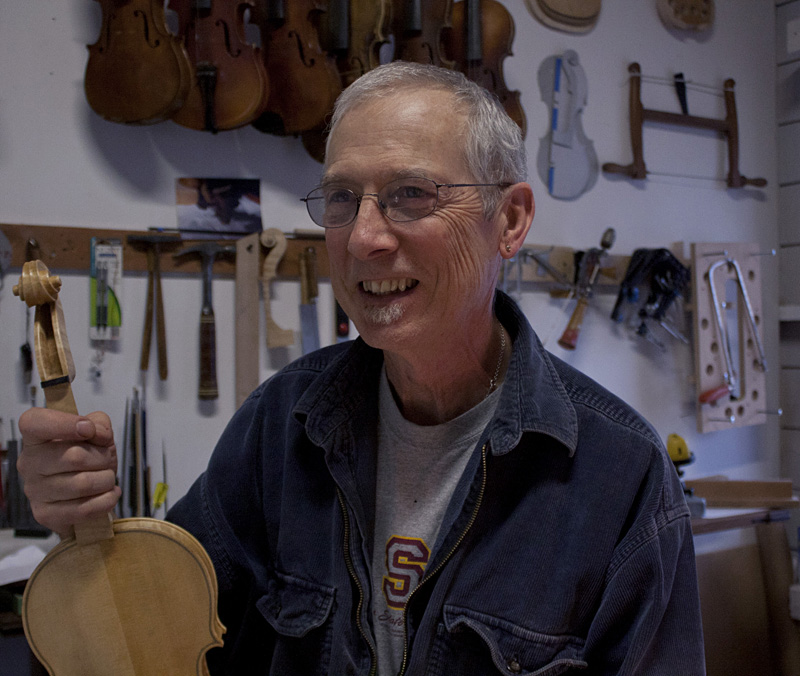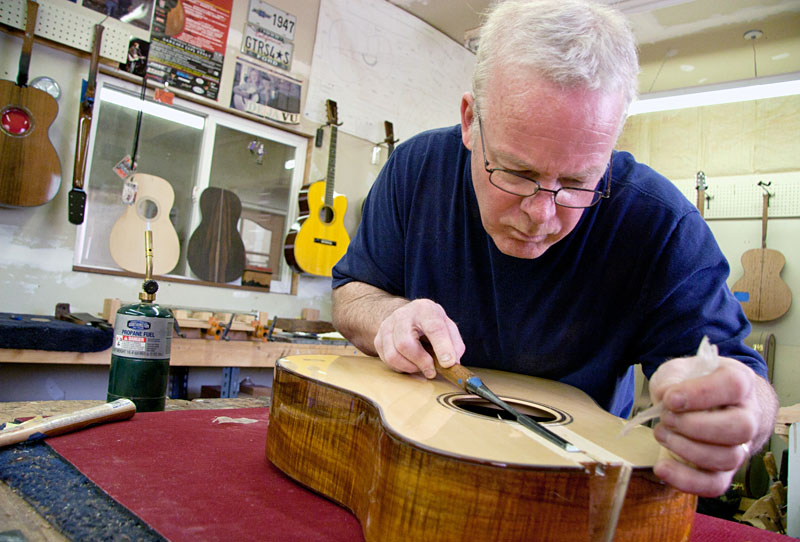Doug Yule was playing guitar with a Boston band called Grass Menagerie in the late ’60s when he happened upon a sound he’d been searching for all his (barely) 20 years. Experimenting, he took the output of a 120-watt amplifier and plugged it into the input of another designed to take only a few milliwatts. As the signal reached the amp’s vacuum tubes, the sound waves compressed and jammed up.
“It was the most beautiful sound,” he says. “It was just sustaining, and the attack was minimized, and it was the sound I’d always been looking for, so I started playing that. And the first show with that band, the amp lasted five minutes and just started smoking. It really blew up.”
Instead of starting loud as a guitar would, the sound swelled. It wasn’t until years later that he realized that “This is like a violin.” But it would be 30 or so years before Yule pried open a fiddle to see how it sang, and another 10 before people bought the instruments he’d created.
He had a lot going on.
In 1968, a houseguest named Sterling Morrison, who played guitar with the Velvet Underground, noticed Yule playing guitar and mentioned it to other band members around the time they severed ties with founding member John Cale. “That comment by Sterling and the fact that I was a Pisces . . . were the reasons that they called and said you can have this job if you want,” Yule says. “Never had to audition or anything.”
Within a week, Yule was onstage with the band. A month later he was in a Los Angeles studio with them as they recorded their third, self-titled, album. Yule played bass and organ and sang backup vocals. And he took vocal lead, lending a melodic innocence to the album’s opening dreamscape ballad, “Candy Says.”
With that album, and moving forward toward their fourth album, Loaded (on which Yule sings lead vocals on “Oh! Sweet Nuthin’ ” and “Who Loves the Sun,” among other tracks), the band toned down the fuzz and drone and became more harmonic and more traditional. In the 1983 biography Up-Tight: The Velvet Underground Story, drummer Maureen Tucker said of Yule’s influence on the band’s sound: “This is going to sound absurd, but I don’t think it hurt the music that much. I don’t think it changed it to weaker music, it just changed it.”
The band fell apart after Loaded, though Yule stuck with it through the critically derided final album, Squeeze. In the early ’70s, he played with former VU frontman Lou Reed. Later that decade, Yule worked on albums with country-rock band American Flyer.
Then he dropped out of the music business.
“The music industry was my first career, and the business end of that really sucks,” Yule said. “It really does. You sit down with a record-industry person, and they say we need some more ‘product.’ And you say ‘Product? What are you talking about, “product”?’ But to them, what to a musician is really very connected work, [with] a lot of emotion and feeling . . . to them, it’s just toothpaste.”
Now 64, Yule has built his own business, Violinisto, crafting violins. He spends days peering down the length of an unfinished panel, wielding handheld tools to sculpt an arch here or adjust the thickness there, one curled shaving at a time.
He likened the appeal of violin-making to doing a crossword or Sudoku puzzle. “There’s a certain satisfaction in taking on a complex problem and making headway,” he says. “To a great extent, that’s what violin-making is all about. It’s about tiny details that mean a lot.”
The recession has been tough on new instrument sales, though. Royalty checks from the Velvet Underground catalog have helped pick up the slack, particularly the inclusion of “I’m Sticking With You” on the soundtrack for the 2007 indie hit Juno. “That was a good year,” he says.
From an outside perspective, going from rock musician to violin maker may seem like self-reinvention. Yule insists it’s not. After he left the music business, he built houses, drawing on a trade he’d learned as a teenager, honing his woodworking skills constructing cabinets and furniture. When his youngest son (he has five children) started taking violin lessons, Yule joined him. Dissatisfied with the way his instrument sounded, he tweaked it, and then built his own from specs in a magazine article. After building four or five, he sought expert advice.
Yule first walked into Ballard’s Lasley & Russ Violins about 15 years ago and sought the advice of luthier Duane Lasley. He returned frequently to learn the subtleties of a craft that’s been nearly perfected after four centuries of refinements.
In his own shop, Yule mounted his first “amateur” violin on a wall behind his bench between more recent constructions “built by a promising student,” each given a woman’s name. He holds the neck of a work-in-progress, and whittles shavings from the pegbox.
Lasley sells Yule’s instruments in his shop, and says a man once bought a quartet of them, intending to perform transcriptions of Velvet Underground music. “I tried really hard to get [Yule] to exploit that [VU] connection to sell his violins,” Lasley said. Yule’s reluctant to do so.
Yule hasn’t given up performing. As he’s learned to build violins, he’s become drawn to old-time string bands, and joins the tight-knit community at the annual Fiddle Tunes festival in Port Townsend, where he met Tom Collicott at a late-night jam session. “We must have played until three in the morning,” he said. Around 2005, Yule enlisted Collicott and Cary Lung to form a laid-back string band called RedDog. They have a monthly gig at Hale’s Brewery in Fremont, and sometimes play elsewhere around the city and at the occasional harvest festival. And they’ve recorded two records, including the most recent, Hard Times. “You see him light up when he gets into the studio,” Collicott said.
Yule likens string-band music to old jazz, where everyone pays attention to one another to decide what to do. “It’s a conversation without monologues,” he says. “It’s really a conversation that’s going on simultaneously and over each other, which I kind of enjoy.”






